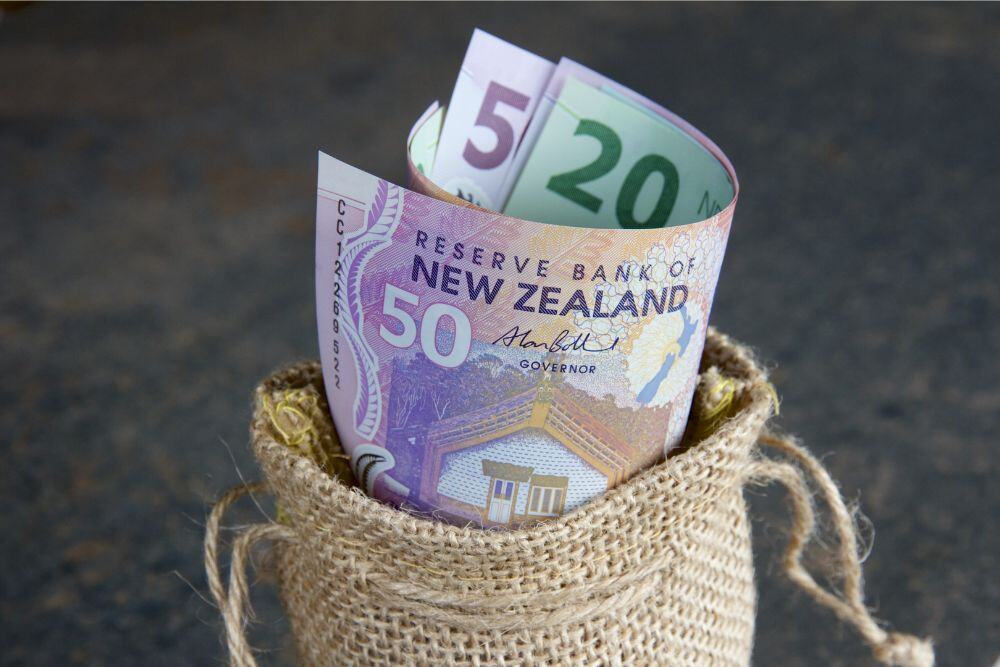Is it Customary to Tip in New Zealand? When & How Much to Tip
New Zealand, with its breathtaking landscapes and warm, welcoming people, is a top destination for travellers from around the world. But whether you’re dining in a restaurant, taking a taxi, or enjoying a guided tour, understanding the local customs can add to your travel experience, and one of the cultural nuances that often confuses visitors is tipping.
At Crown Currency Exchange, we’ve made tipping in New Zealand much easier to understand with this complete guide. We’ll look at tipping culture, explain when it might be appropriate to leave a tip, and how to do it correctly without offending anyone.
What is the Tipping Culture in New Zealand?

New Zealanders pride themselves on providing excellent service without the expectation of a tip, and this approach aligns with the country’s broader values of fairness and equality. So, while tipping is appreciated, it is never expected or required, and service standards remain high regardless.
Why is Tipping Uncommon in New Zealand?

The reason tipping is uncommon in New Zealand is that the country has a fair wage system with a minimum wage higher than in many countries. This higher wage reduces the need for tips as a supplement to low salaries, allowing employees to earn a liveable income without relying on additional gratuities from customers.
Cultural norms also play a significant part in why tipping is uncommon in New Zealand. As there is a strong emphasis on equality and not creating a sense of obligation or hierarchy between server and customer, New Zealanders generally view tipping as an unnecessary addition to fair compensation for work, and this cultural perspective promotes an environment where everyone is treated equally, so no one feels pressured to provide extra payment for services rendered.
When Should You Consider Leaving a Tip?

While tipping is not customary or expected in New Zealand, there are certain situations where it might be considered polite or appreciated. Here are some scenarios where tipping in New Zealand is acceptable, along with guidance on how much to tip:
Restaurants
In restaurants, leaving a tip can be a nice gesture if you feel you received particularly outstanding service. However, remember that leaving a tip is entirely optional, so there’s no pressure to do so.
What is a Fair Tip to Leave in Restaurants in New Zealand?
As a general rule, a tip of between 5% – 10% of your total bill would be an appropriate amount to leave in a restaurant. So, should your bill come to $200 NZD ($182 AUD), a maximum tip of $20 NZD ($18 AUD) would be suitable.
Bars and Cafes
Tipping at bars and cafes is uncommon, but if you do feel you received exceptional service and would like to show your appreciation, you can leave a small tip.
What is a Fair Tip to Leave Hotel Staff in Fiji?
Tipping is a little different in bars and cafes compared to restaurants, and instead of leaving a percentage of your bill, you should round your total up. For example, if your coffee costs $4.50 NZD ($4.10 AUD) you can leave $5 NZD ($4.50 AUD) in cash and tell the server to keep the change for themselves.
Hotel Staff
You only need to tip a taxi driver in New Zealand if you've taken a particularly long journey or if they carried your luggage into your hotel.
What is a Fair Tip to Leave Hotel Staff in New Zealand?
For hotel keepers, a tip of $1 – $2 NZD ($0.90 – $1.80 AUD) per bag is an acceptable amount to tip. Housekeeping staff should be tipped the same amount, although this will need to be left for them for each day of your stay rather than as a one-time tip.
Taxi Drivers
A taxi driver will not expect tips, but if you feel they have gone above and beyond by helping you unload your luggage or have gotten you to your destination in record time, a small tip is often appreciated.
What is a Fair Tip to Leave Taxi Drivers in New Zealand?
Rounding up your fare to the nearest dollar is the easiest way of tipping taxi drivers. For example, if your fare is $27.50 NZD ($25.10 AUD), you could round it up to $30 NZD ($27.30 AUD).
New Zealand Tipping Etiquette: How to Give a Tip?

If you decide to leave a tip in any of the instances above, it’s important to follow certain etiquette to ensure your gesture is received positively. Firstly, offering your tip discreetly is key; handing cash directly to the person who served you or placing it in a designated tip jar is the best thing to do.
Also, while some establishments may allow you to add a tip to your credit card payment, cash is often preferred as it ensures that the tip goes directly to the intended recipient.
You should also make sure you accompany your tip with a sincere thank you, as this will strengthen the gesture and make the recipient feel more valued, rather than simply handing them some money.
Are There Any Cases Where You Should Avoid Tipping in New Zealand?
There are certain cases in which you shouldn’t leave a tip at all, no matter if you feel obliged to do so. For instance, employees in supermarkets and retail stores do not expect tips.
The same goes for routine services like petrol station attendants or public transport employees do.
Heading to New Zealand? Get the Best Rates of New Zealand Dollars at Crown Currency
When it comes to tipping in New Zealand, the best way to show your appreciation is with cash. This not only ensures the tip goes directly to the intended recipient, but it also means you won’t incur expensive International Transaction Fees for using your cards. At Crown Currency Exchange, you’ll find great rates on New Zealand Dollars with no hidden costs and zero commission fees. Head to one of our many locations today and speak to our friendly team about exchanging your Australian Dollars for New Zealand Dollars today.
FAQs
What is the Tipping Culture in New Zealand?
New Zealanders pride themselves on providing excellent service without the expectation of a tip, and this approach aligns with the country’s broader values of fairness and equality. So, while tipping is appreciated, it is never expected or required, and service standards remain high regardless.
Why is Tipping Uncommon in New Zealand?
The reason tipping is uncommon in New Zealand is that the country has a fair wage system with a minimum wage higher than in many countries. This higher wage reduces the need for tips as a supplement to low salaries, allowing employees to earn a liveable income without relying on additional gratuities from customers.
Cultural norms also play a significant part in why tipping is uncommon in New Zealand. As there is a strong emphasis on equality and not creating a sense of obligation or hierarchy between server and customer, New Zealanders generally view tipping as an unnecessary addition to fair compensation for work, and this cultural perspective promotes an environment where everyone is treated equally, so no one feels pressured to provide extra payment for services rendered.
When Should You Consider Leaving a Tip?
While tipping is not customary or expected in New Zealand, there are certain situations where it might be considered polite or appreciated. Here are some scenarios where tipping in New Zealand is acceptable, along with guidance on how much to tip:
Restaurants
In restaurants, leaving a tip can be a nice gesture if you feel you received particularly outstanding service. However, remember that leaving a tip is entirely optional, so there’s no pressure to do so.
What is a Fair Tip to Leave in Restaurants in New Zealand?
As a general rule, a tip of between 5% – 10% of your total bill would be an appropriate amount to leave in a restaurant. So, should your bill come to $200 NZD ($182 AUD), a maximum tip of $20 NZD ($18 AUD) would be suitable.
Bars and Cafes
Tipping at bars and cafes is uncommon, but if you do feel you received exceptional service and would like to show your appreciation, you can leave a small tip.
What is a Fair Tip to Leave Hotel Staff in Fiji?
Tipping is a little different in bars and cafes compared to restaurants, and instead of leaving a percentage of your bill, you should round your total up. For example, if your coffee costs $4.50 NZD ($4.10 AUD) you can leave $5 NZD ($4.50 AUD) in cash and tell the server to keep the change for themselves.
Hotel Staff
You only need to tip a taxi driver in New Zealand if you've taken a particularly long journey or if they carried your luggage into your hotel.
What is a Fair Tip to Leave Hotel Staff in New Zealand?
For hotel keepers, a tip of $1 – $2 NZD ($0.90 – $1.80 AUD) per bag is an acceptable amount to tip. Housekeeping staff should be tipped the same amount, although this will need to be left for them for each day of your stay rather than as a one-time tip.
Taxi Drivers
A taxi driver will not expect tips, but if you feel they have gone above and beyond by helping you unload your luggage or have gotten you to your destination in record time, a small tip is often appreciated.
What is a Fair Tip to Leave Taxi Drivers in New Zealand?
Rounding up your fare to the nearest dollar is the easiest way of tipping taxi drivers. For example, if your fare is $27.50 NZD ($25.10 AUD), you could round it up to $30 NZD ($27.30 AUD).
New Zealand Tipping Etiquette: How to Give a Tip?
If you decide to leave a tip in any of the instances above, it’s important to follow certain etiquette to ensure your gesture is received positively. Firstly, offering your tip discreetly is key; handing cash directly to the person who served you or placing it in a designated tip jar is the best thing to do. Also, while some establishments may allow you to add a tip to your credit card payment, cash is often preferred as it ensures that the tip goes directly to the intended recipient. You should also make sure you accompany your tip with a sincere thank you, as this will strengthen the gesture and make the recipient feel more valued, rather than simply handing them some money.
Are There Any Cases Where You Should Avoid Tipping in New Zealand?
There are certain cases in which you shouldn’t leave a tip at all, no matter if you feel obliged to do so. For instance, employees in supermarkets and retail stores do not expect tips. The same goes for routine services like petrol station attendants or public transport employees do.




.png)

